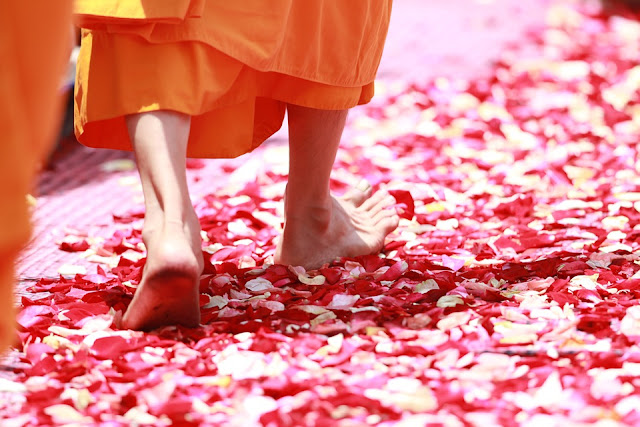[Psychology] Anxiety diseases that we unconsciously experience
Lindlatecba - I want to ask you, have you ever heard the term anxiety?if you don't , I want give you a little explanation and if you already know what it is, then I hope this post adding more knowledge for you.
WHAT IS ANXIETY ??
Lindlatecba - Anxiety is a condition that is characterized by anxiety and excessive worry about the events of daily life without a clear reason to worry about it.People with symptoms of general anxiety disorder tend to always anticipate disasters and cannot stop worrying about health, finance, family, work, or school. These concerns are often unrealistic or disproportionate to the situation. Everyday life becomes a condition that always causes fear, scare and anxiety. Finally, anxiety that dominates the person's mind will disrupt daily functions, including work, school, social activities, and relationships.
so anxiety is excessive fear ... and what to fear are many different form. My friends used to experience it. she is afraid of death there are also those who are afraid of crazy, afraid of being outdated. : D
my friend experienced this disorder early January 2013, bro. until now but now she is a little less often not as often as before
go on, bro. :D
WHAT IS THE SYMPTOM?
The symptoms are as follows:
- Motor tension: muscle twitching, stiffness, aches, chest pain, joint pain.
- Autonomic hyperactivity: shortness of breath, palpitations, wet palms, dry mouth, nausea, mules, diarrhea etc.
- if the presence of organic abnormalities is generally found, complaints are not comparable to the organ abnormalities found.
- Excessive vigilance and reduced arrest: easily shocked, irritable, difficult to concentrate, difficult to sleep etc.
from the symptoms of the symptoms above many think they have heart disease but after checking it turns out nothing is wrong!
ANXIETY LEVEL:
There are 4 levels of anxiety, namely: Light, Medium, Heavy and Panic
1. Mild anxiety is daily tension, individuals are still alert and the field of perception is widespread. Can motivate individuals to learn and be able to solve problems effectively.
Example: Someone who faces a final exam, an adult couple who wants to get married, an individual who wants to go to college.
2. Moderate Anxiety Is the individual focused on the mind of concern, there is a narrowing of the field of perception, can still do something with the direction of others. Example: A spouse who faces the birth of a first child with high risk, a family who is facing division, an individual who experiences conflict at work
3. Weight anxiety is narrower perception, smaller attention to detail, unable to think about other things. All behaviors intended to reduce anxiety need lots of commands and direction. Example: Individuals who experience fire or loss of loved ones, Individuals in hostage conditions.
4. Panic is the individual loses self-control, lost self-control, lost attention, unable to do anything even with orders. Increased motor activity, deviations in perception, loss of rational thoughts, inability to think effectively (Brust, 2007).
CLINICAL DESCRIPTION:
Judging from the clinical aspect, there are 5 types of anxiety disorders:
1) panic disorder,
2) phobic disorder,
3) thorough anxiety disorder,
4) obsessive-compulsive disorder,
5) and past-traumatic stress (House cit Stark, 2002)
Anxiety can arise primary called general anxiety disorder, while secondary anxiety can arise from physical disorders or arising from depression. Pathological anxiety is indicated by symptoms and behavior of real dysfunction or disruption of daily life.
Clinical features vary, but can develop into symptoms of panic, hysteria, phobia, somatization, hypochondriasis, and obsessive compulsive disorder. Diagnosis of anxiety disorder is established when symptoms are present, including complaints of anxiety, worry, anxiety, hesitation to act, feelings of excessive fear, anxiety, fear of death, fear of going insane, which affect almost all aspects of life. so that the functions of consideration of common sense, feelings and behavior are affected. In addition, there were also complaints or physical or physiological symptoms of the body.
Now The Healing Sist.. :D
THERAPY :
Therapy in anxiety can generally be done in two ways, namely psychological therapy (psychotherapy) or therapy with drugs (pharmacotherapy).
High therapeutic success rates are reported in cases with early diagnosis. Simple psychotherapy is very effective, especially in the context of good patient and doctor relations, so it can help reduce unnecessary pharmacotherapy.
1. Psychological Therapy
Psychiatric or psychological counseling and environmental manipulation are also often needed. Usually psychological therapies for anxiety are part of management to deal with most medical conditions. However, to do such psychotherapy is not always possible, especially in hospitals. The reach of service availability is often limited, and not all patients are ready to agree to a particular scenario.
Therapy for anxiety does not have to be done by a psychiatrist, but should be applied by all competent doctors, so that service limitations can be overcome (House cit Stark, 2002).
Providing information is always the first step in helping anxiety patients, where the information provided must be in accordance with the level and always give great hope for each individual to recover.
Most patients want a clarity and information about the condition that they are experiencing, by doing this action, showing the patient that they are truly cared for and cared for.
Effective communication is essential in providing information, doctors are trained in dealing with open questions from patients, able to understand the psychological condition, and the ability to provide good advice is needed, so that effective communication will be created. Which will be able to help patients in reducing their psychological burden (House cit Stark, 2002)
2. Religious Therapy
This therapy is often classified as a psychological therapy, but unfortunately not all competent doctors are able to do it, and this therapy can usually only be done by someone who is an expert in the spiritual field. Religious therapy usually helps patients to be more calm and give patients time to understand themselves, thus creating an awareness of themselves. This tends to be more effective because the awareness arises from the patient's own self.
This therapy is done through sharing with religious experts who are trusted by the patient, and then the religious expert gives advice to get closer to God, but not infrequently this kind of therapy is done individually without a guide who guides. This kind of therapy sometimes eventually forms a new characteristic or character of the sufferer.
3. Pharmacological therapy
Some types of drugs can usually be used to overcome and reduce anxiety, and each drug has its own advantages and disadvantages. Even the use of a substance for a long time will not produce good results for the physical health of the patient himself.
The most commonly used drugs to treat anxiety are benzodiazepines (BDPs) (Fracchione, 2004). As for some types of drugs commonly used are:
- Diazepam
- Lorazepam
- Alprazolam
- Propanolol
- Amitriptyline
Termination of consumption of certain substances can also help reduce anxiety, usually the use of some substances that contain analgesics and alcohol which have been mentioned above, that consumption of these substances is actually an escape from anxiety symptoms but ultimately in certain situations, cessation these substances actually become an important part of anxiety management programs.
Because dependence on these substances can lead to more anxiety, although at the beginning of its use it seems to help alleviate the symptoms of sufferers anxiety.
Read Also :
Easiest to Eliminated ANXIETY
35 Ways to Overcome Anxiety Disorder
Common Drugs for Anxiety | Powerful Drugs to Reduce Anxiety
Audio Keyword:
Now.. Time to share and help others.
Seriously, Be Social :)





